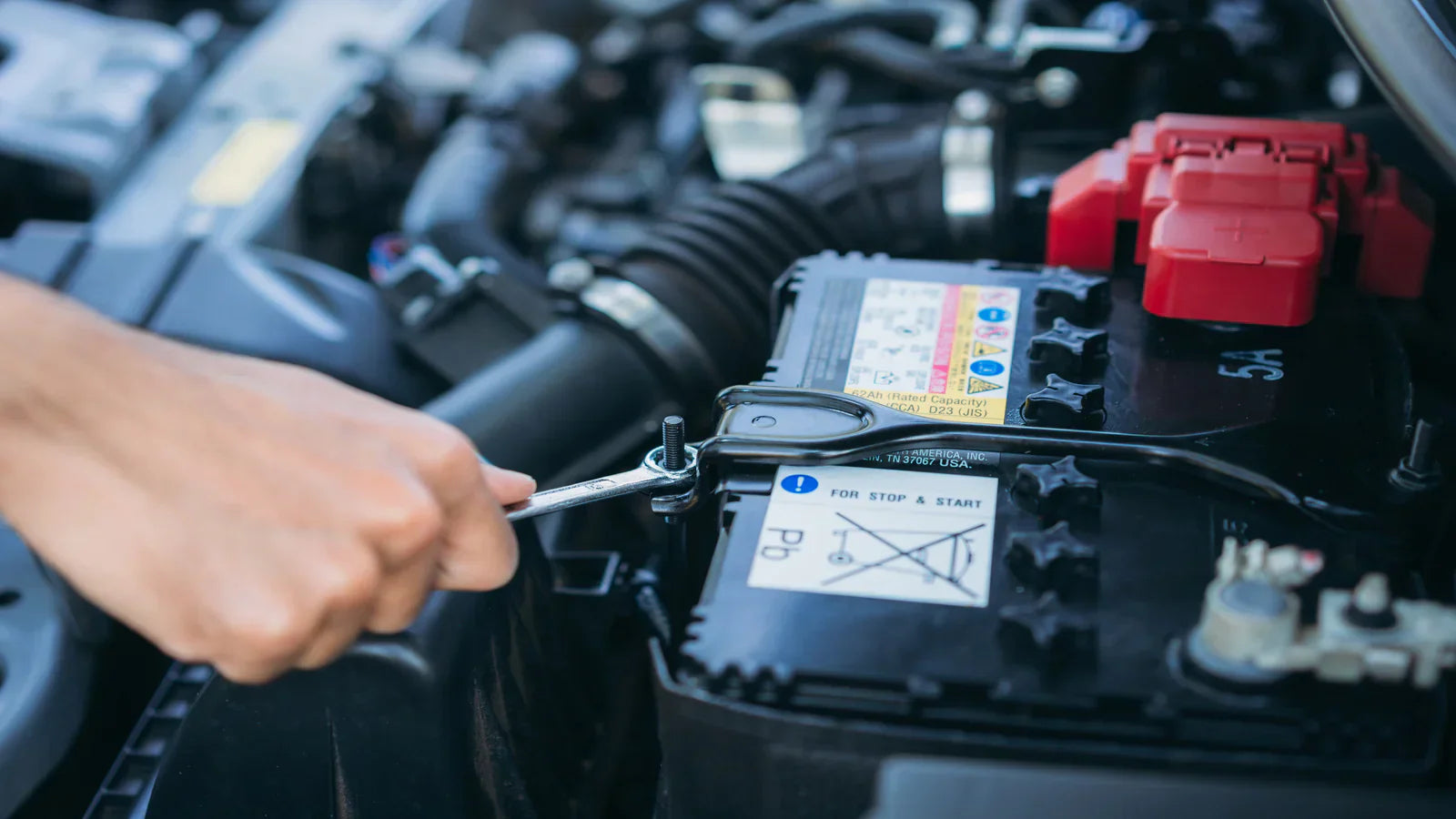Most people believe that the cold of winter leads to dead car batteries. However, the summer heat is another silent killer. In fact, hot temperature can be more detrimental to certain things than cold weather. Heat gradually degrades your car battery by speeding up the wear and tear on its components, causing critical fluids to evaporate, and increasing stress on your electrical system.
If you've ever gone back to a hot parking lot and found that your car wouldn't start, you know what hot weather can do to your car battery. This complete guide will explain why car batteries die in the summer, what warning signs to look out for, and how to take care of them so they last longer.
Understanding How Car Batteries Work
Before looking into how heat impacts your car battery, it's helpful to know how it works. A car battery saves electricity and sends it to different parts of the car, such as the alternator, to keep the voltage stable and start the engine. Lead-acid batteries are the most common type of car battery. They have lead plates that are buried in an electrolyte that is a mix of sulfuric acid and water. Changes in temperature have a big effect on the chemical processes in the battery.

Why Car Batteries Fail in Summer Heat
There are many important reasons why summer heat is so damaging to car batteries:
-
Electrolyte Evaporation: Excessive heat causes the liquid electrolyte to evaporate, especially if the battery is old or poorly maintained. When there isn't enough fluid, the lead plates are left out in the open, which lowers the charge capacity and raises the internal resistance.
-
Accelerated Internal Corrosion: Summer heat acts as a catalyst, accelerating corrosion on internal grids and plates. This process reduces the total battery life and can result in internal short circuits or cell breakdowns.
-
Overcharging from the Alternator: In high temperatures, the voltage regulator may not function optimally, allowing the alternator to overcharge the battery, especially in older vehicles with alternators that do not compensate for temperature. Overcharging raises internal battery temperatures and can damage the plates or swell the case.
-
Increased Demand from In-Car Systems: Summer driving requires air conditioning, repeated device charges, and longer traffic delays. Continuous demand and low battery efficiency might quickly cause performance concerns.
-
Thermal Expansion and Structural Damage: Heat can physically deform your car battery, causing the casing to swell. Warped cases signal chemical breakdown and should be taken seriously.
Environmental Factors That Worsen Heat-Related Battery Failure
Cities with extensive concrete and asphalt surfaces retain more heat. This effect, known as a heat island, raises under-hood temperatures significantly, even when the car is parked. Also, short trips don’t give your alternator enough time to fully recharge the battery. In summer, with heat already draining capacity, such conditions can rapidly diminish battery performance.

Symptoms of A Weak or Failing Car Battery in Hot Weather
Catching the signs of a failing battery early in summer can prevent you from being stranded. Let’s look at these common warning symptoms:
-
Sluggish Engine Crank: A slow engine start, especially when the car has been sitting in the sun, is often the first red flag.
-
Clicking or No Sound When Starting: This usually means the battery doesn’t have enough voltage to engage the starter solenoid. It could be discharged or dying.
-
Dimming Interior or Exterior Lights: If your headlights flicker or dim when idling, or your dashboard display resets, this indicates unstable voltage delivery.
-
Battery Warning Light: A glowing battery icon on the dashboard means a problem with the charging system, either the battery, alternator, or connections.
-
Swollen Battery Case: An expanded battery housing is a clear sign of overheating or overcharging. This condition usually requires immediate replacement.
-
Rotten Egg Smell: A strong sulfuric odor, such as rotten eggs, indicates that the automobile battery is leaking or undergoing chemical decomposition. Be careful with this because it's dangerous.
How to Check Car Battery Health in Summer
Here’s what you can do to check your car battery health:
-
Use a Multimeter: Measure voltage with the car off. A healthy car battery should read between 12.6 and 12.8 volts. If it's less than 12.4 volts, it's being charged less.
-
Load Testing: Many auto parts stores offer free battery load tests, which simulate the stress of starting the car and help determine if your battery holds a charge under pressure.
-
Visual Inspection: Look for corrosion on terminals, cracks or swelling, and loose or frayed cables.

Proactive Maintenance Tips to Maximize Car Battery Lifespan in Summer
-
Park in Shade or Use Reflective Sunshades: Avoid direct sunlight to reduce cabin and engine bay heat. When parking for long periods, use reflective windshield covers.
-
Keep Terminals Clean and Tight: Corroded terminals reduce current flow and strain the battery. Clean using a baking soda-water solution and a brush, then apply dielectric grease to protect the terminals.
-
Check Electrolyte Levels: For non-sealed batteries, carefully open the caps and make sure the electrolyte covers the plates. If necessary, add distilled water.
-
Monitor Alternator Output: An alternator that overcharges your battery can destroy it quickly in the heat. Get it tested periodically, especially if your battery seems to fail often.
-
Reduce Accessory Usage at Startup: Turn off air conditioning, radios, and lights before turning the key. Give the battery a better chance to focus on ignition.
-
Use a Battery Insulation Blanket: In extremely hot climates, battery wraps or sleeves help buffer external heat and maintain internal chemical balance.
-
Schedule Preventative Inspections: Before summer starts, have a professional check your battery. It's better to change a battery that's getting weak than to get stuck in the middle of a wave.
When Should You Replace Your Car Battery?
-
After 3-5 Years: Even if it seems fine, it may be close to failure, especially in hot climates.
-
If It’s Been Repeatedly Jumped: Repeated jumps hurt cells inside and lower their capacity.
-
If the Case is Swollen or Cracked: Physical damage is a clear indicator of heat or chemical distress.
-
If it Fails a Load Test: Take action—replace it before it fails entirely.

Don’t Let Summer Heat Destroy Your Car Battery
Summer may be the season for road trips, vacations, and wide highways, but it is also the most demanding time for your car's battery. Unlike the evident bite of winter, heat softly and gradually depletes your battery, lowering reliability, increasing the likelihood of failure, and potentially leaving you stranded. But it does not have to be this way. You may keep one step ahead of failure by providing watchful maintenance, doing routine checks, and learning how summer heat affects the health of your car battery.













